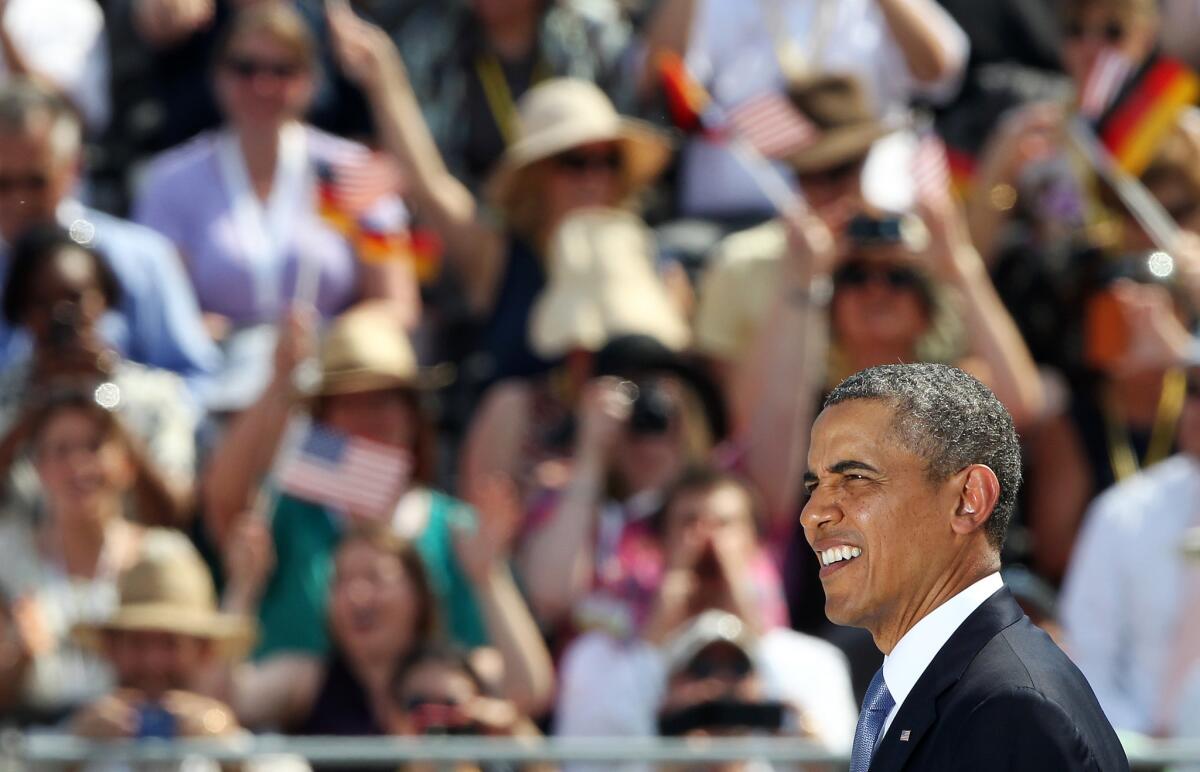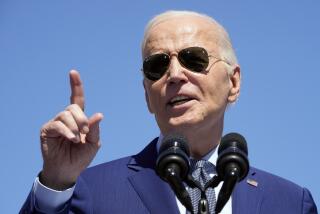Despite controversies, Obama’s job approval holds steady in new poll

- Share via
Despite several weeks of troubles, including controversy over IRS targeting of conservative groups and National Security Agency surveillance of pretty much everybody, President Obama’s job approval has remained at almost exactly the same level it has been for most of the year, according to a new Pew Research Center survey.
The finding continues a well-established pattern: In the highly polarized political environment, both Obama’s supporters and opponents have dug-in positions that have proved extremely resistant to change. Obama’s job approval, at 49% in the current survey, sits well within the narrow band in which it has fluctuated this year. The percentage saying they disapprove, 43%, also has changed very little.
A second poll, by YouGov for the Economist magazine, shows lower marks for Obama, 43% approve, 50% disapprove, but a similar pattern of only minor change this year. The YouGov poll, which is Internet-based, generally has shown lower approval levels for Obama than the telephone-based Pew survey.
PHOTOS: 2013’s memorable political moments
A key factor in the steadiness of those ratings has been the partisan divide. In the Pew poll, Democrats overwhelmingly support Obama, with 85% giving him positive marks. Just 16% of Republicans approve. A similarly sharp divide affected President George W. Bush’s approval ratings, although Bush suffered sharper losses among independents during his second term, and his overall job approval in the spring of his fifth year had fallen to 42%.
Beyond partisanship, warmer feelings about the economy may be bolstering Obama and offsetting doubts about government surveillance, the Pew poll indicates.
The percentage of adults who said they see the national economy as “poor” has dropped steadily this year and now stands at 29%, while the percentage who said they see the economy as “excellent” or “good” has risen to 23%. Both of those numbers are the best ratings since before Obama took office. A plurality of respondents, 47% said they see the economy as “fair,” and the number who expect it to improve over the course of the year is considerably larger than the share who expect it to get worse, 33%-19%. The percentage saying jobs are easy to find also has increased.
Among Democrats, optimism about the economic future has grown since March, with 53% of those respondents saying they expect the economy to get better, compared with 40% earlier this spring. Expectations also improved significantly among respondents with annual household incomes between $30,000 and $75,000.
Among Republican respondents, the percentage expressing optimism about the economy has remained low and steady, 15%, but fewer expect things to get worse, 19% compared with 32% in March.
Respondents gave Obama negative marks on his handling of the economy, with 44% approving and 50% disapproving, but those grades have improved since March, when they stood at 40%-56%.
On the issue of surveillance, the poll offers mixed reviews for Obama. By 56%-35%, respondents said they approve of the job he has done handling terrorism. But by 42%-51%, they offered a negative view of his job performance on privacy and civil liberties.
Those who identify themselves as independents were particularly likely to show a gap in how they judge Obama on those two issues, with 52% saying they approve of his job on terrorism, but only 28% approving on privacy. Other groups showing particularly wide gaps in attitudes on those two issues are college graduates, an important part of Obama’s electoral coalition, and Republicans who identify with the Tea Party.
In addition to handling terrorism, Obama got his best marks in the poll for handling of the environment, where 57% said they approve, compared with 33% who disapprove.
The Pew survey was conducted Wednesday through Sunday among 1,512 Americans aged 18 and older. It has a margin of error of plus or minus 2.9 percentage points.
Follow Politics Now on Twitter and Facebook
Twitter/@DavidLauter
More to Read
Get the L.A. Times Politics newsletter
Deeply reported insights into legislation, politics and policy from Sacramento, Washington and beyond. In your inbox twice per week.
You may occasionally receive promotional content from the Los Angeles Times.











